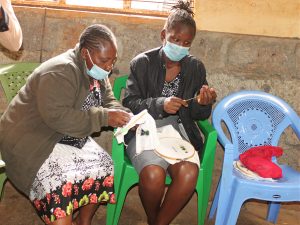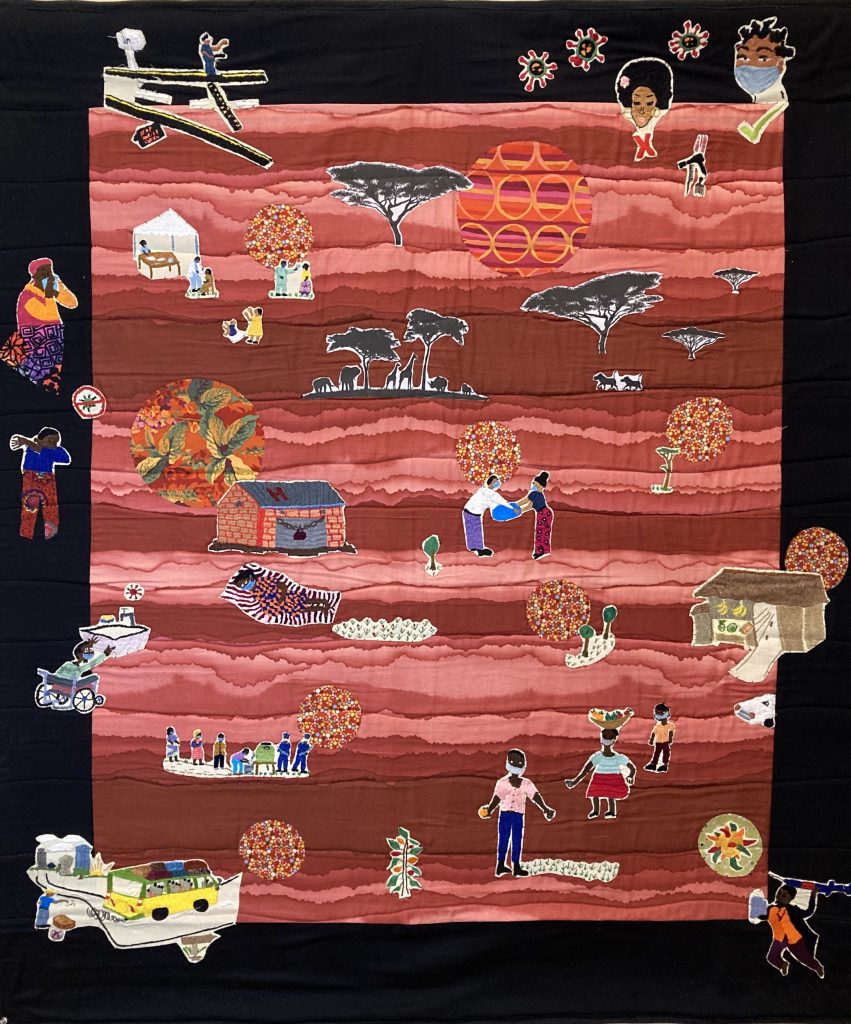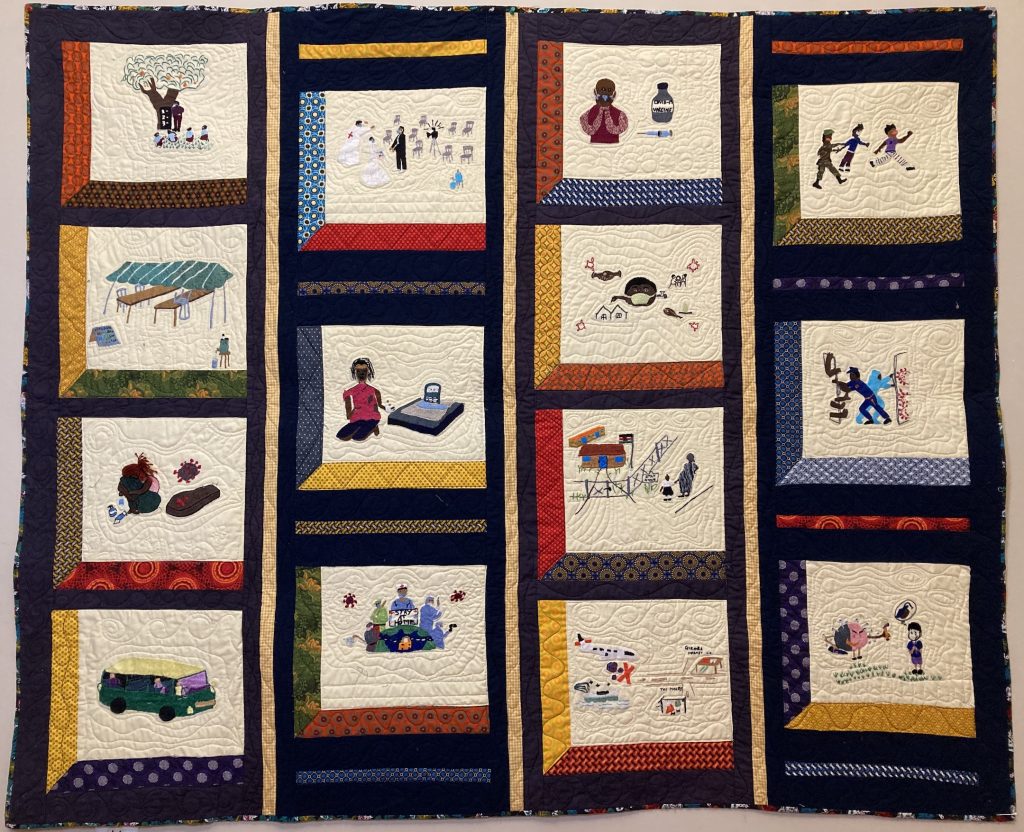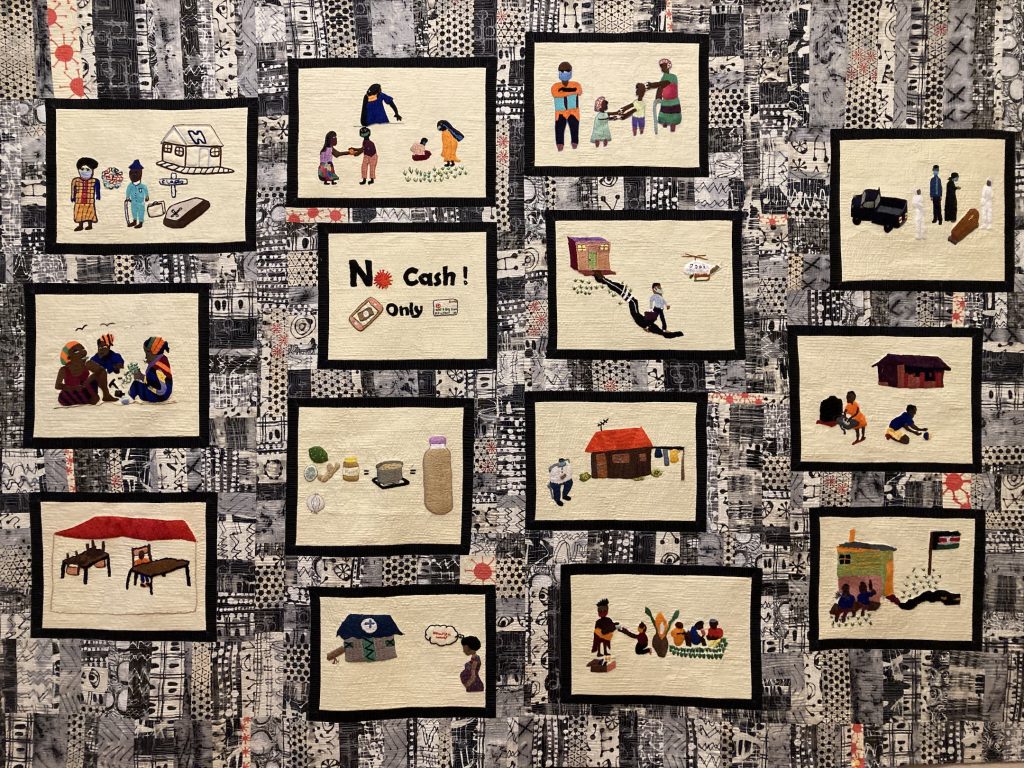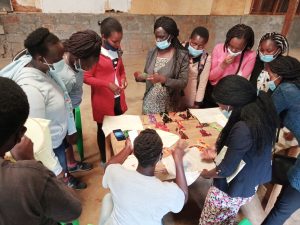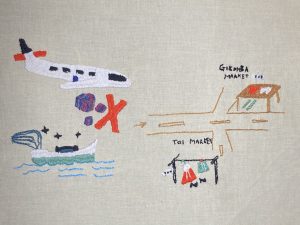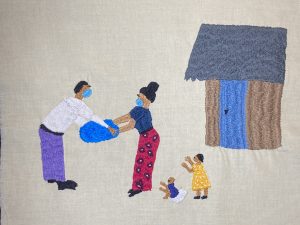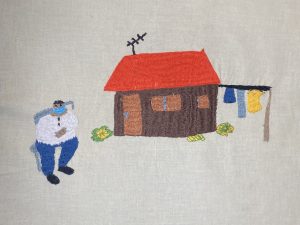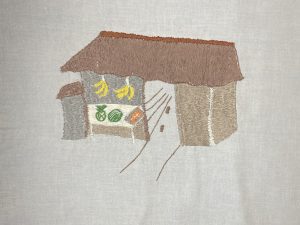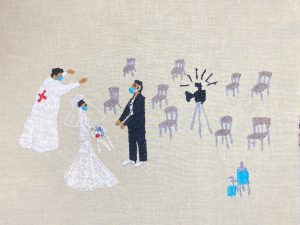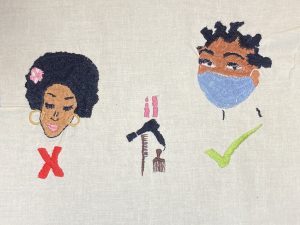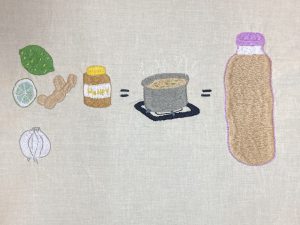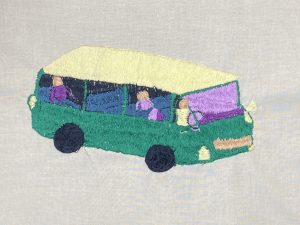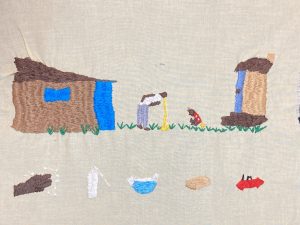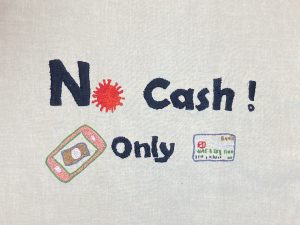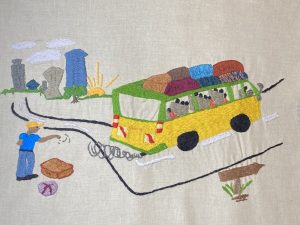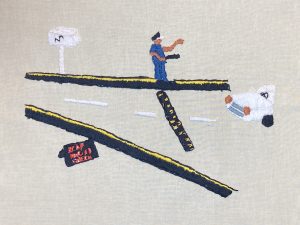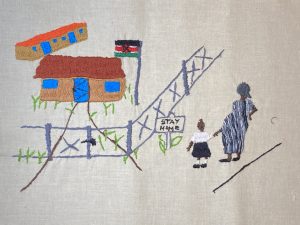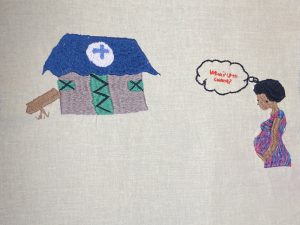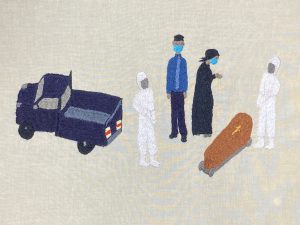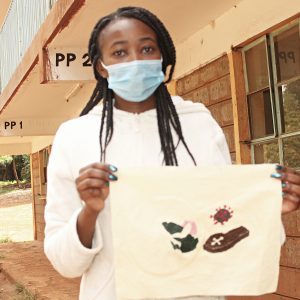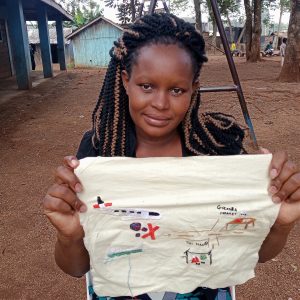 |
NO IMPORTS – Agnes Mogire, Kibera
Agnes was shopping for her now newborn when the ban on imports was announced. She says clothes in the second hand markets of Gikomba and Toi reduced drastically and in a few months increased in prices. Traders were also hoarding their bales because no one knew when the authorities would lift this ban. What was available in the market was of bad quality and Agnes had to search long and hard to find something suitable for her children. |
|
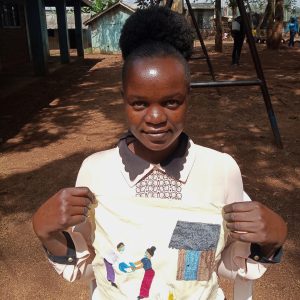 |
GOOD LANDLORD AND TENANT – Beldine Akinyi, Kibera
Beldine has a good landlord who offered a helping hand to her and her neighbors during the difficult season of 2020. While many landlords were pulling out the roofs for tenants, hers was kind and generous; giving them food rations and peace of mind. |
|
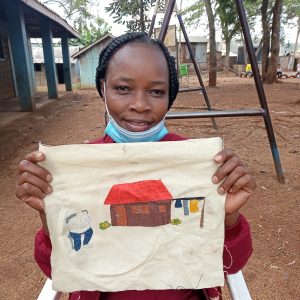 |
LOCKED HOUSES – Carol Achieng, Kibera
Many poor families in Kibera came home to find their houses locked. Due to job losses and closed businesses, making ends meet for some of my neighbors was hard. A good number of landlords padlocked their houses keeping desperate tenants out in the cold, many had nowhere to go because families were already crowded due to the lockdown and closed schools. |
|
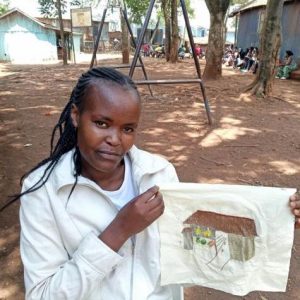 |
NO ENTRY-GROCERY – Carol Kemuma, Kibera
Carol Kemuma counted losses during the pandemic in 2020. Customers stayed away for fear of the coronavirus even though she had taken all measures to observe proper sanitation. Most of her stock of vegetables got spoiled and she had to eventually close her business. It was also very difficult to get fresh produce from the market due to the lockdown as fewer vehicles were ferrying goods from upcountry and what was available was very expensive. |
|
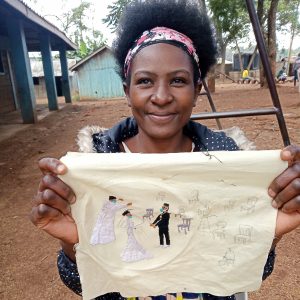 |
WEDDING – Catherine Nyambeki, Kibera
Due to the lockdown of 2020 till now (March 2021) many Kenyans have been unable to visit, let alone see their loved ones. I was not able to attend my sister’s wedding last year which took place in my rural home and I felt really sad. Very few family members attended because only 50 people were allowed into the venue. The rest of us could only watch on social media from our phones and it just did not feel the same. |
|
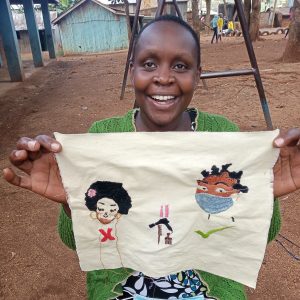 |
NO ENTRY IN SALONS – Cecilia Marigi, Kibera
Many businesses closed during the lockdown and especially those that required a lot of contact between the apprentice and their customers. Salons were some of the places that closed and were forced out of business during the pandemic and many Kenyans could not get to their favorite stylists. A good number of my friends in this line of business got really desperate as they counted losses. |
|
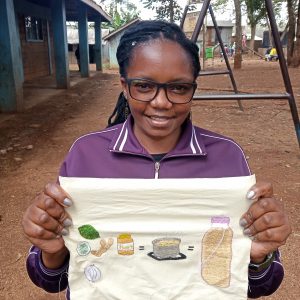 |
CORONA BUSTER – Eunice Wanjiku, Kibera
This is a concoction of ginger, garlic, lemon and honey which Kenyans have been boiling since the coronavirus started spreading. Many Kenyans, especially transport service providers, would carry a bottle and drink it throughout the day in order to boost their immunity and escape infection. |
|
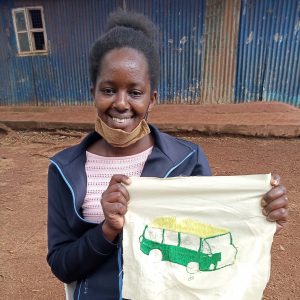 |
SOCIAL DISTANCING – Gladys Wanjiku, Kibera
During the coronavirus pandemic we had to maintain social distance even in public transport vehicles – PSV (In Swahili called Matatu). I had a hard time moving from one point to another because I could wait for a matatu for a very long time. Passengers had to sit one meter apart and so fare increased and became very expensive because PSVs were now carrying half their normal capacity. |
|
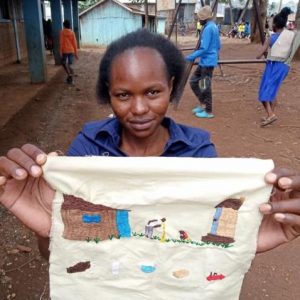 |
NO CHOLERA IN 2020 – Irene Akinyi, Kibera
In Kibera, in the years past, you could see children defecating and sick people vomiting in open places but in the year 2020 till now things are a bit different. No major outbreak of Cholera has been reported so far possibly because of increased hygiene. There are many Hand washing points and soap is freely available; people are wearing masks and keep distance from each other especially in public places. This helped in keeping better hygiene even in our neighborhood. |
|
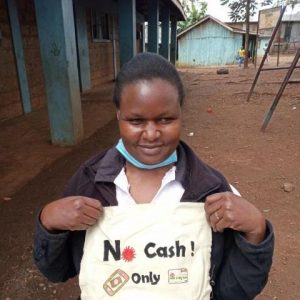 |
NO CASH – Maureen Nyanduko Macharama, Kibera
Cash transactions, even at local stores, were restricted during the pandemic. Various traders in Kibera demanded payment via mobile cash transfer and we were turned away from buying essential goods at various shops. Many of us feared getting coronavirus from paper money but not all of us could afford the minimum costs of money transfer and many mobile cash agents ran out of cash float due to bad businesses; life was quite difficult. |
|
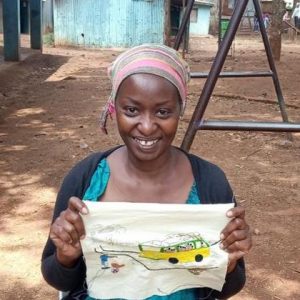 |
UPCOUNTRY TRAVEL – Stella Makena, Kibera
Many people left the city to their rural homes mainly because of loss of jobs and closed businesses. Families travelled upcountry where life is cheaper and movement restrictions are less. They were also avoiding being stranded in the city during the inter-county lockdown and 8pm-5am curfews. Casual laborers could not find work hence surviving in the city with its high expenses was unbearable especially for low income earners. Since schools, offices and businesses were closed it made many travel upcountry for fear of prolonged uncertainty. |
|
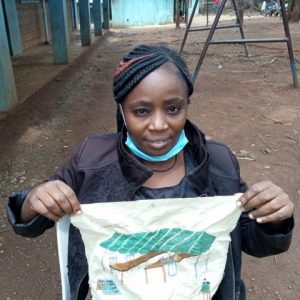 |
CLOSED BUSINESSES – Patricia Waithera, Kibera
Many restaurant businesses were closed by the authorities in March 2020 and only those that could do food deliveries were allowed to operate under strict conditions. In Kibera majority of the eateries in my neighborhood went out of business and shut down completely. Even when restrictions eased many customers stayed away for fear of the disease. |
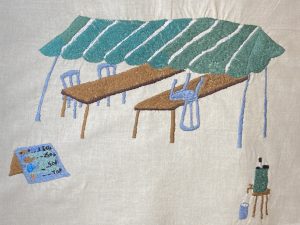 |
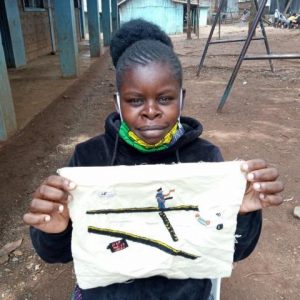 |
CURFEW – Pheny Achieng, Kibera
In Kenya, curfew was imposed from 8pm to 4am for many months. It was then moved to 11pm till 5am. During these trying times many Kenyans lost their lives. Police were reportedly shooting, arresting or harassing anyone found in the streets during curfew hours; beating them and demanding bribes. For mothers like me. we had to wait till morning; we could not step out at night even if there was a medical emergency for fear of arrest or harassment. |
|
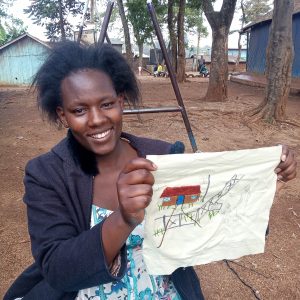 |
CLOSED SCHOOLS – Vena Moige, Kibera
In order to curb the spread of coronavirus, schools and all places of learning were closed in 2020. My son stayed at home for a whole year and it really put a strain on me. Many parents also refused their children from going out to play for fear of the spread of coronavirus. I could not open my business as often as I needed and was unable to complete my daily chores because there just was not enough time. I picked this piece so that I can show my children many years from now, about the coronavirus pandemic and how life was. |
|
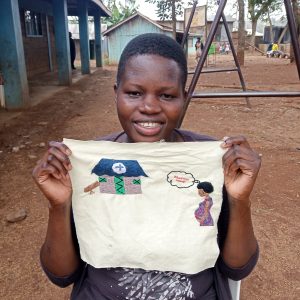 |
ANC CLINIC – Winnie Achieng, Kibera
Winnie was expecting her second child in 2020. She remembers how scared she was to visit the ANC (antenatal care) clinic for fear of coronavirus infection. She knows of a number of expectant mothers who missed their clinic appointments because they knew how crowded health facilities got in Kibera. She is glad to have delivered safely and thanks God that she and her family are safe. |
|
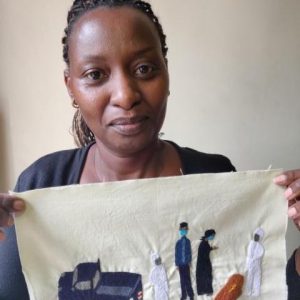 |
FUNERALS – Stella Makena, Kibera
The coronavirus pandemic changed many of our cultural practices especially funerals and weddings as strict measures were implemented. A maximum of 100 people were allowed and one needed to secure permits and notices from the area administration and ensure there was good sanitation and social distancing at the function. Failure to comply was reported by neighbors to the authorities and several arrests were made. Funerals were conducted within 48hrs and had to be supervised by a public health official so as to avoid cultural practices that could lead to more infections; as a result, some burials were done at night, something considered a taboo by many communities in Kenya. |
|
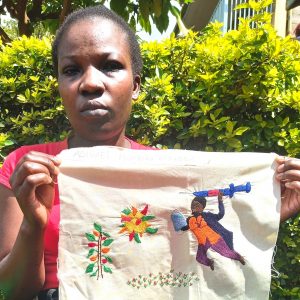 |
Abigael Kwamboka, Kangemi
My square is a special tribute to all frontline workers and everyone fighting this pandemic. Doctors, nurses are trying their best at least 99%to fight covid-19 in all ways they can. Like my square here, she has a mask and a vaccine trying to jump over to fight the disease. Likewise to the society they put on their masks always, wash their hands, keep social distance, using sanitizers and stay home, stay safe. |
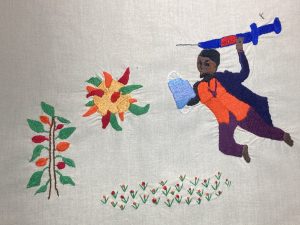 |
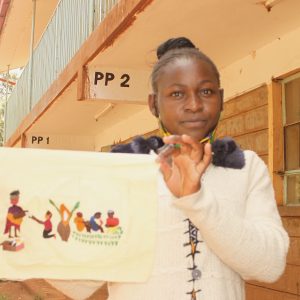 |
Betty Namalwa, Kangemi
My drawing is all about the shortage of food and how it has caused many to go hungry. Immediately after Corona hit Kenya, there was a lockdown. People lost their jobs and in turn many became beggars in the streets of Nairobi to help feed themselves or their families. |
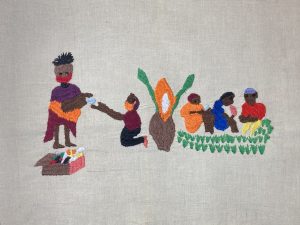 |
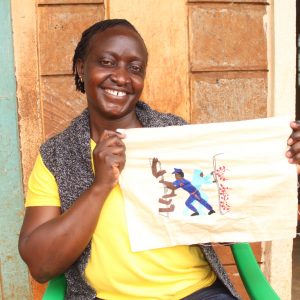 |
Caren Mbayaki, Kangemi
My block explains some of the measure put in place by the government and health workers to control the spread of covid 19. When covid struck early last year, a lot of people were scared and decided to stay indoors, during this period, a lot of families started experiencing Gender Based Abuse/Violence and homes weren’t safe anymore. In this block you can see a police officer trying to force citizens to stay in and the front liners risking their lives by ensuring that the virus does not spread further. |
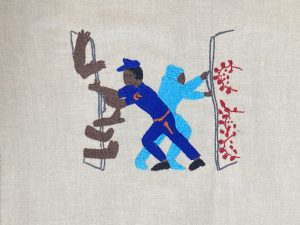 |
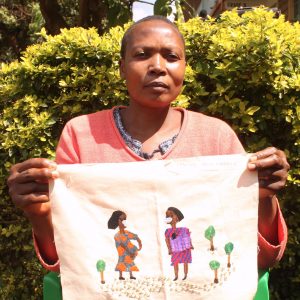 |
Caroline Barasa, Kangemi
The Covid-19 pandemic shut down many schools. Many teenagers started to turn to immoral activities. This resulted in many early pregnancies. |
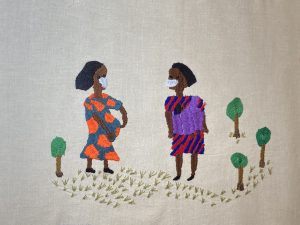 |
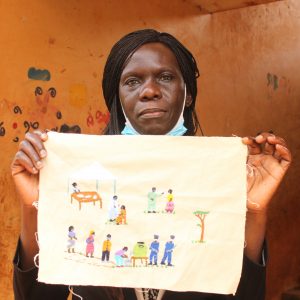 |
Christine Kibuka, Kangemi
One of the most shocking moments during this pandemic was when I was on my way to town after staying inside my home for some time during the lockdown. On my way, I passed by one of the busiest streets expecting to see a crowd as always. However, it was empty except for a few people. The few people there were mainly medical officers doing COVID-19 tests on people. There were also few food vendors left outside and instead of a crowd of customers, all I saw were policemen enforcing social distancing and a handful of women shopping. This new normal will take a while for me to get used to. |
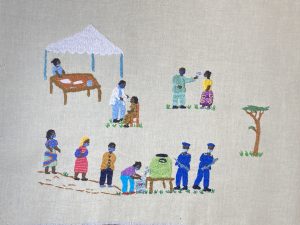 |
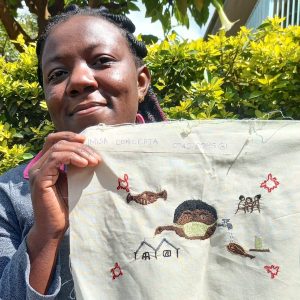 |
Imisa Concept, Kangemi
This virus has changed my lifestyle greatly. I fear going near crowded places in fear of my own safety and no longer shake hands or hug friends and family. Nevertheless, until we can get the vaccine, washing our hands with soap and water and wearing our masks is the only tool we have to protect ourselves. |
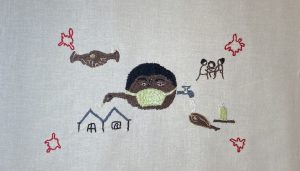 |
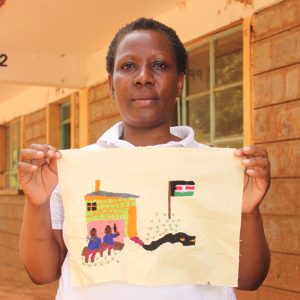 |
Elizabeth Wafula, Kangemi
Due to the closure of schools, the boys turned to abusing drugs to pass the time. My drawing is about that problem. That without school, many boys will go idle and turn to drugs. Some have taken alcohol and even morphine. |
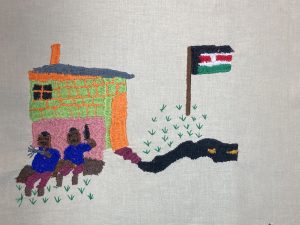 |
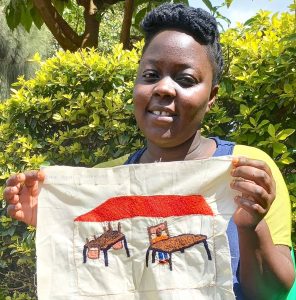 |
Diana Adeya, Kangemi
Everything was fine, life was normal until covid started ….. Job loss , sickness, unemployment , depression, closing of schools, lockdown in the country, so many restrictions and regulations …Then the curfew happened. This was the final blow to all restaurants and bars in the whole country .
Later on there was an announcement of only take away in fast food restaurants. Workers were reduced hence unemployment . The owner of restaurants became hopeless and depressed, their business going down low income so sad. A place that was once joyous and happy and very crowded is now empty and quiet. |
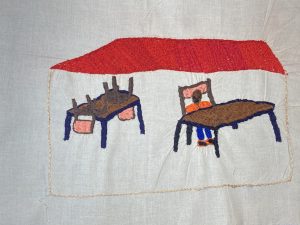 |
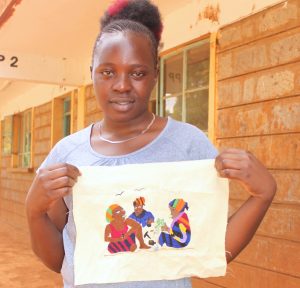 |
Everline Makungu, Kangemi
I reside in the Kangemi slums of Nairobi, Kenya. I am a single mother of one boy and I take care of my parents who don’t have a source of income. This COVID has harshly affected me in that it has denied me any source of income and distanced me from my parents. Before COVID, I was a door to door labourer washing people’s clothes but COVID ended it all. My parents and I have been surviving on well wishers but we still struggle. The stress of COVID and the aging sickness of my parents have taken a toll on me. I hope this embroidery project will put us in at least a better place. |
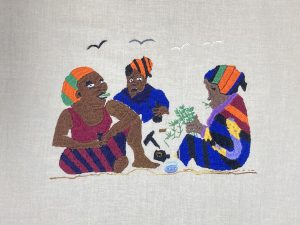 |
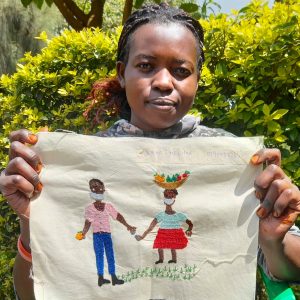 |
Diana Nelima, Kangemi
With Covid-19, many people became jobless. Parents faced challenges in providing the basic needs to their children. This has resulted in children selling fruits in streets to find money for food. |
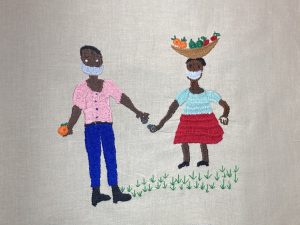 |
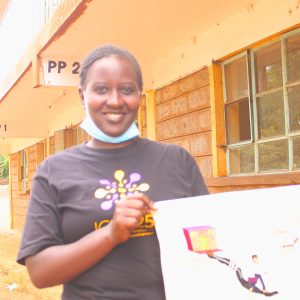 |
Florence Wangari, Kangemi
Due to COVID-19, the companies had to lay off much of their staff to avoid closing down completely. Regardless, many people lost their jobs since many companies ended up closing down as the pandemic continued. Since so many people were laid off and had no money, the pandemic hit closer to many more people. |
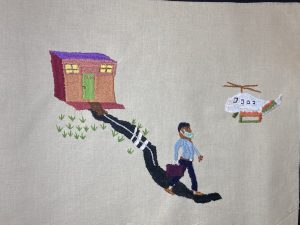 |
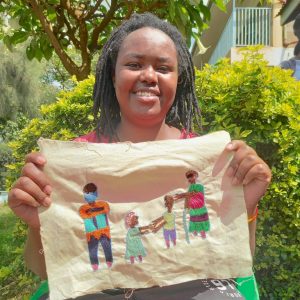 |
Harriet Njeri, Kangemi
COVID-19 has put a strain on all families. Divorces and death have taken a toll on all of us worldwide. My COVID story is about a family of 4. The husband follows all COVID regulations and procedures and the mother lives with a disability. She stays home to take care of her 2 children but tragedy strikes when she catches the virus. Her son is then infected by the mother who is asymptomatic, then the son infects his younger sister. Now they are all sick. This is a common story for us in Kenya and all over the world. |
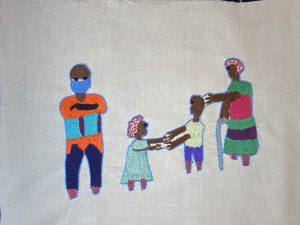 |
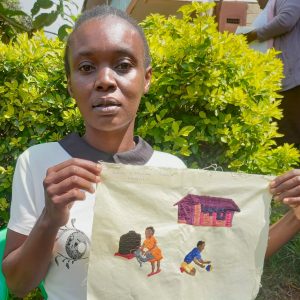 |
Loise Mbelesia, Kangemi
My work is showing how COVID-19 has affected everyone, including us in the slums. The girl below is taking precaution by washing her hands to prevent the spread of COVID. And the boy is playing around at home because kids are told to stay at home. |
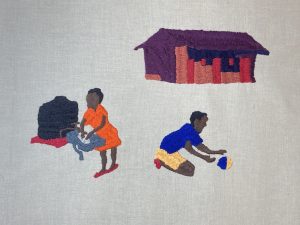 |
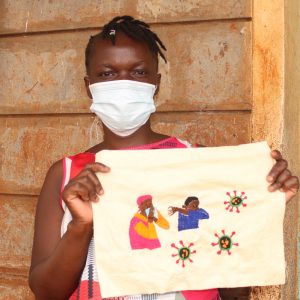 |
Lydia Awino
When the pandemic hit the world, everyone had to change their way of living and individual behavior in order to curb the spread of the virus. We had to be more aware of how to protect ourselves and each other such as covering our noses while sneezing as compared to before when people would sneeze into the air. It has been a tough experience for all of us as we all have had to learn how to cope with the new normal. When COVID came, we had to change our habits. We had to be more cautious and aware of our actions. |
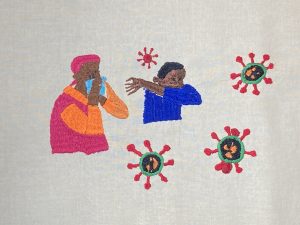 |
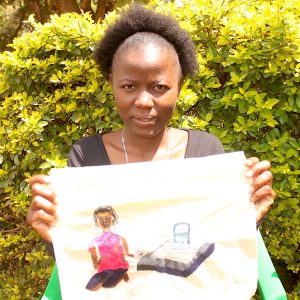 |
Maureen Weingaya, Kangemi
I chose this block because it is a real story of what happened in this community I live in. Immediately covid strike the country, their is increase in stigma and discrimination especially to people and families affected by the virus. My block is about Mary, 1st born in the family of 3 children, they were raised by a single mother who used to sell green vegetables at the local market. Mary’s mother felt sick and went to the hospital where she was advised to get covid test and she tested positive for the virus and died after 4 days leaving Mary and her siblings. No relatives accepted to stay with the kids fearing to be infected with covid. The kids had bills to pay i.e house rent and food which no one would support them and this forced Mary to go to the street to beg for money in order to support her siblings. Covid 19 deaths have led to an increase in the number of orphans and street children too. |
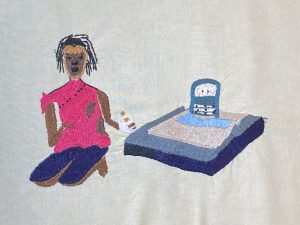 |
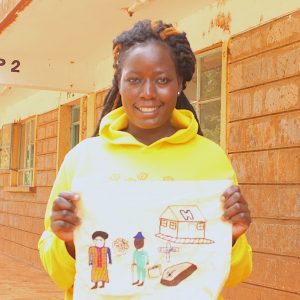 |
Meriline Ingaso, Kangemi
I am a single mother of 2 boys and 1 girl. I am also a teacher. COVID has put me through great suffering as I struggle to pay rent and buy food for my children. It has been a struggle and sometimes I feel like giving up. My square is about a woman and man in front of a hospital and a coffin. The man is going to be tested for COVID at the hospital. Coffins are a common sight in front of hospitals. |
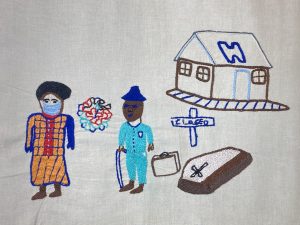 |
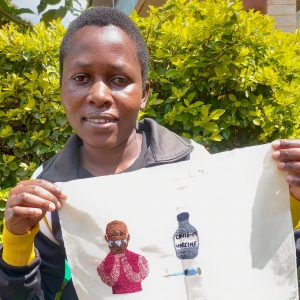 |
Modester Makhungu
When COVID-19 came to Kenya in March, 2020, many people did not take it seriously. They thought it was just a fever that would end soon. The disease quickly spread all over the country. Most people lost their jobs. Schools were closed and eventually, churches.
Covid-19 really affected me because my sister, who was our bread winner, lost her job of working in a restaurant. Life became difficult and we got used to going to sleep hungry.
At this point, the country was ravaged by this disease and people were begging for a vaccine. Eventually, the government brought the vaccine to Kenya and people were able to get their injections. Unfortunately, injections were given at hospitals, where many people are scared of going. They say that hospitals giving the injections will give them other health problems. The picture I’ve drawn shows how some fear being vaccinated. |
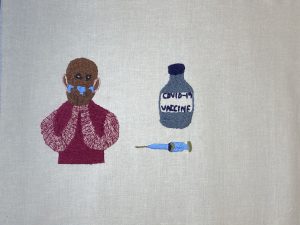 |
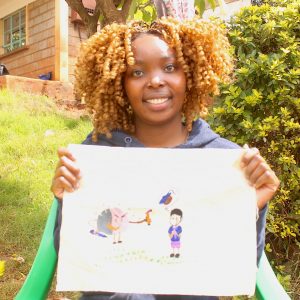 |
Pauline Makeri, Kangemi
The COVID-19 pandemic has affected every educational system worldwide leading to the closure of primary, secondary, and post-secondary schools. It has also changed how we learn. We are always wearing masks and maintaining social distancing. Through all of this, I am still grateful to be joining the embroidery team and cannot wait for what the future holds for me.
My drawing below explores how the COVID-19 pandemic has impacted our education system where students have to maintain social distancing and wear masks at a time when resources are stretched to its limits. Even with guidelines enforced, COVID-19 cases were still going up. To reduce the further spread of this pandemic, the government has decided to temporarily close schools. This has come with the unintended consequence of further worsening the ability of already disadvantaged children and families to learn. |
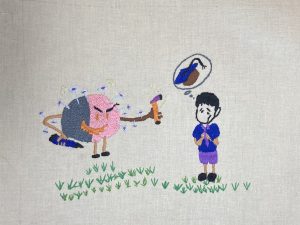 |
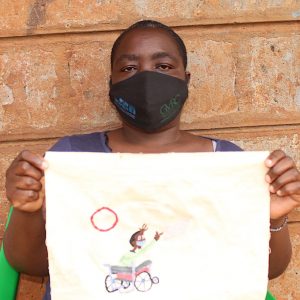 |
Rachael Afumbi, Kangemi
I am a single mom of two kids and I’m physically disabled. In my picture is a person living with a disability trying to wash his hands and can’t reach the tap. He is trying to follow the covid 19 protocols but seems hard for him when it comes to how the tap was kept very high for such people in the community. More when he touches the wheels as he moves it leads to high risk of the virus. I hear by request that this people living with disability are to be assisted 8n all ways possible to meet the covid 19 protocols. |
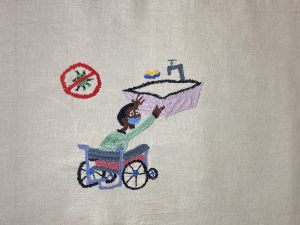 |
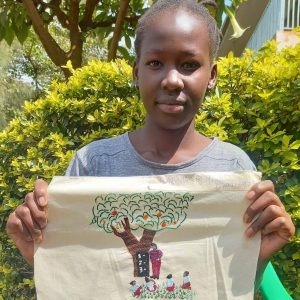 |
Sabina Mutiso, Kangemi
When schools resumed in the middle of COVID, students were required to socially distance due to health concerns. Unfortunately, many schools did not have enough space to accommodate social distancing and many students were forced into outside classrooms. Students in the outside classrooms had to deal with rain and the hot weather with little shade. It made learning very difficult. |
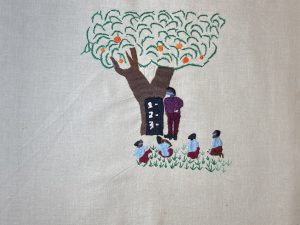 |
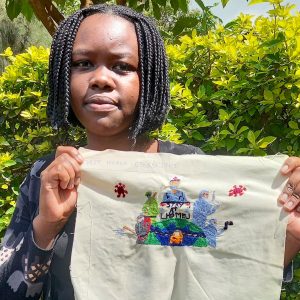 |
Spencer Moraa, Kangemi
My story is inspired by the covid 19 Pandemic that came abruptly disrupting the normal way of life and people forced to adapt to a new normal. One of the effects it brought was lockdown and the world was put under lockdown and is shown on my piece where the world is closed using a padlock thereby limiting movement of people across the world. Also on my work is a team of frontline workers who have been at the forefront to ensure the virus does not spread. I decided to embroider some of them to show appreciation for the good work they’ve done and in addition they have a strong message that they pass to everyone which is for everyone to stay at home so as to be safe from the Coronavirus. |
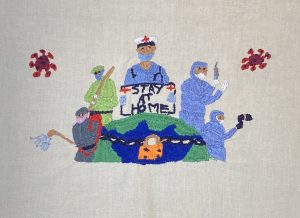 |
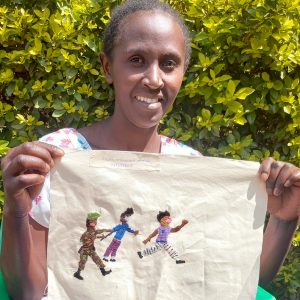 |
Susan Nyambura, Kangemi
My work below is to represent the people harassed by police during and before the curfew time was enforced. |
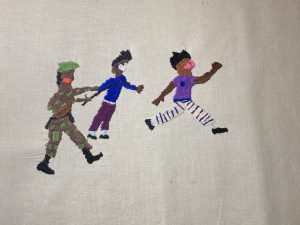 |
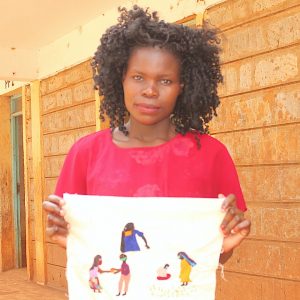 |
Susy Namusai, Kangemi
I am a single mother of 1 son. Due to COVID-19, it has been a struggle to raise my son as school fees, food, and clothing bills have piled up. Due to a lack of money, I have also been forced to stop my own education as well. This is a common story for many of us. COVID-19 has led to many people to suffer from stress and depression due to a lack of jobs leading to people begging for food. Some will die of hunger before they catch COVID. The hospitals are congested so even if we catch COVID, there is a high chance that you won’t be able to find treatment. We are all suffering. |
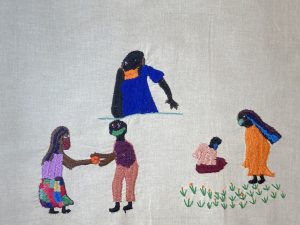 |
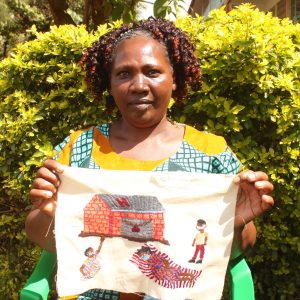 |
Teresia Kithanga, Kangemi
When the pandemic hit, schools were closed due to safety reasons. As a private school teacher, this meant that I had lost my salary. I could not move to another place to find a job since I feared contracting the virus and the government had placed restrictions on travel. Even before the virus, there were already health challenges due to the lack of services of nearby hospitals. The shortage of services got worse with COVID as hospitals struggled to even give care to pregnant women during labor. I found myself idle and without income. However, thanks to the embroidery team we were provided with some materials to make masks. This helped give us some income as well as a way to pass the time. |
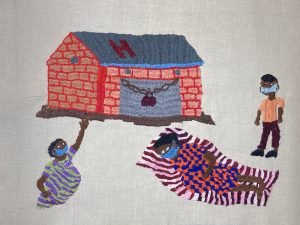 |
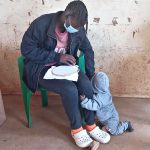 The stories are part of a 2-year global project by AP to provide women and girls with a creative outlet for their frustration after months of lockdown and fear. As of writing, the project has yielded over 180 stories and six quilts from High School students in Arlington Virginia, Wilmington NC, Zimbabwe and Nepal. Infections are rising in the Global South and we are still accepting stories.
The stories are part of a 2-year global project by AP to provide women and girls with a creative outlet for their frustration after months of lockdown and fear. As of writing, the project has yielded over 180 stories and six quilts from High School students in Arlington Virginia, Wilmington NC, Zimbabwe and Nepal. Infections are rising in the Global South and we are still accepting stories. 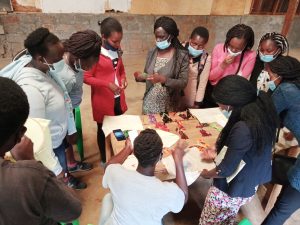 Both groups have been led by inspiring community activists – Caren Mbyaki in Kangemi and Stella Makena in Kibera. As in the earlier projects Christina Kibuka provided top-up training in the early stages. Gill Rebelo, a former president of the Nairobi quilt guild, coordinated the project from Nairobi. Bobbi Fitzsimmons, Delaney Rogers, Ryan Pham,and Saliha Gozel worked on the project from the US. Abby Hack produced these web pages.
Both groups have been led by inspiring community activists – Caren Mbyaki in Kangemi and Stella Makena in Kibera. As in the earlier projects Christina Kibuka provided top-up training in the early stages. Gill Rebelo, a former president of the Nairobi quilt guild, coordinated the project from Nairobi. Bobbi Fitzsimmons, Delaney Rogers, Ryan Pham,and Saliha Gozel worked on the project from the US. Abby Hack produced these web pages.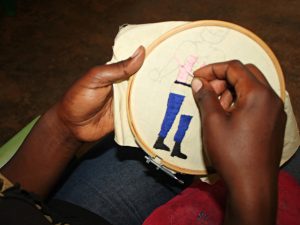 The three artists who produced COVID squares from Nepal have developed a beautiful style all of their own, which AP is promoting with design schools in the US. The magnificent Wilmington quilts were commissioned and exhibited by the Cameron Art Museum, and provided focus and morale for the museum and its friends during the dark days of the pandemic.
The three artists who produced COVID squares from Nepal have developed a beautiful style all of their own, which AP is promoting with design schools in the US. The magnificent Wilmington quilts were commissioned and exhibited by the Cameron Art Museum, and provided focus and morale for the museum and its friends during the dark days of the pandemic.
